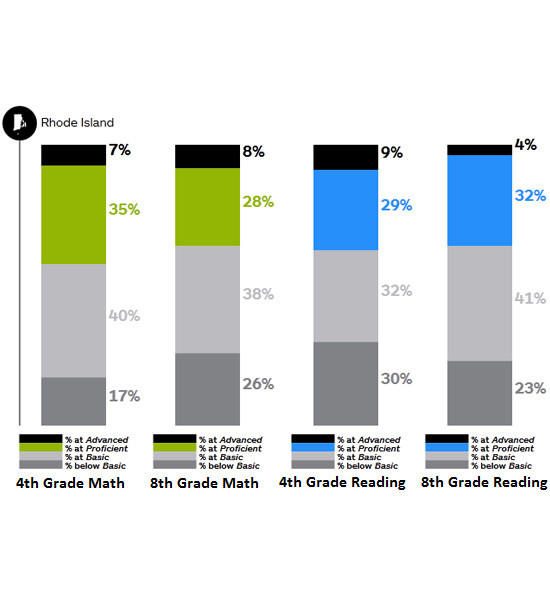
(Updated, 5:30 p.m.)
PROVIDENCE – For the first time in the history of the National Assessment of Educational Progress, Rhode Island students scored above the national average in all four math and reading assessments.
Results released today by the National Center for Education Statistics of the U.S. Department of Education show that Rhode Island stands one percentage point above the national average in fourth-grade mathematics, four points above the national average in fourth-grade reading, and two points above the national average for eight-grade mathematics and reading.
Despite this development for the assessments, also known as “The Nation’s Report Card,” Rhode Island’s 2013 scores are considered “not significantly different” from the national average except in fourth-grade reading, where the scores are significantly higher than the national average, according to information from the R.I. Department of Education.
Rhode Island’s 2013 scores are also considered “not significantly different” from the 2011 scores, although the eighth-grade scores are significantly higher than the 2009 scores in both mathematics and reading.
Results are based on the percentage of students who performed at or above the proficient level, defined as showing demonstrated competency over challenging subject matter, including knowledge, application of knowledge to real-world situations, and analytical skills.
“It’s a first for Rhode Island, but we know we’re really close to the national average, and we still have a lot of improvement we want to make,” said Education Commissioner Deborah A. Gist. “We didn’t soar above the national average, but we feel like it’s a milestone we want to celebrate, knowing it’s just a part of our continued journey.”
Four years ago, Rhode Island students lagged significantly behind the nation as a whole in grade eight. Over the past four years, Rhode Island eighth-grade students have far outpaced the nation as a whole in improvements in both mathematics and reading and now stand above the national average in both subject areas.
Rhode Island fourth-grade students have matched the national pace in both mathematics and reading and have remained above the national average in both subject areas.
The center administers the assessments in math and reading every two years to students in grades four and eight. Results are reported at the national and state levels only – not at the district, school or individual-student level.
On the 2013 assessments, Rhode Island students advanced by 3 percentage points since the previous assessment in 2011 in reading for both fourth grade and eighth grade. Since 2011, Rhode Island eighth-grade students advanced by 2 percentage points in math. Also since 2011, Rhode Island fourth-grade students declined by 1 percentage point in mathematics, but still stand 1 percentage point above the national average.
As in 2009, Rhode Island remains the lowest-scoring state in New England on three of the four assessments (and 1 percentage point ahead of Maine in fourth-grade reading). However, New England is the highest performing region in the country, and over the past four years, the gap between Rhode Island and the next New England state (either Connecticut or Maine) has narrowed.
Some achievement gaps still exist, with scores for Black, Hispanic and economically disadvantaged students remaining about 20 percentage points below the state average, despite gains over the past four years.
Also over the past four years, the performance of students with disabilities or who are learning English as a second language has either declined or improved at a much lower rate than the state average.
RI-CAN: the Rhode Island Campaign for Achievement Now, late Thursday released a mixed analysis of the assessments. While the state has overall seen steady gains since 2003 and the narrowing of some gaps for Latino students in fourth-grade math and eighth-grade reading, the analysis also found some increased gaps between white and non-white student performance.
Among these, the gap for reading proficiency among white and black fourth graders grew from 20 to 30 points from 2011 to 2013, RI-CAN found, while among fourth-grade reading scores, Latino students have the largest minority achievement gap, scoring 31 points below their white peers.
“It’s important to recognize the positive gains for Rhode Island students on the NAEP as we continue the work to transform our schools,” said RI-CAN Executive Director Christine Lopes. “We need to hold all students to high expectations as we prepare them for college and careers but also hone in on those who continue to lag behind.”
The R.I. Department of Education will post further information on these scores on its website at www.ride.ri.gov.
To view detailed information about the 2013 National Assessment of Educational Progress mathematics and reading results, visit http://nces.ed.gov/nationsreportcard.











